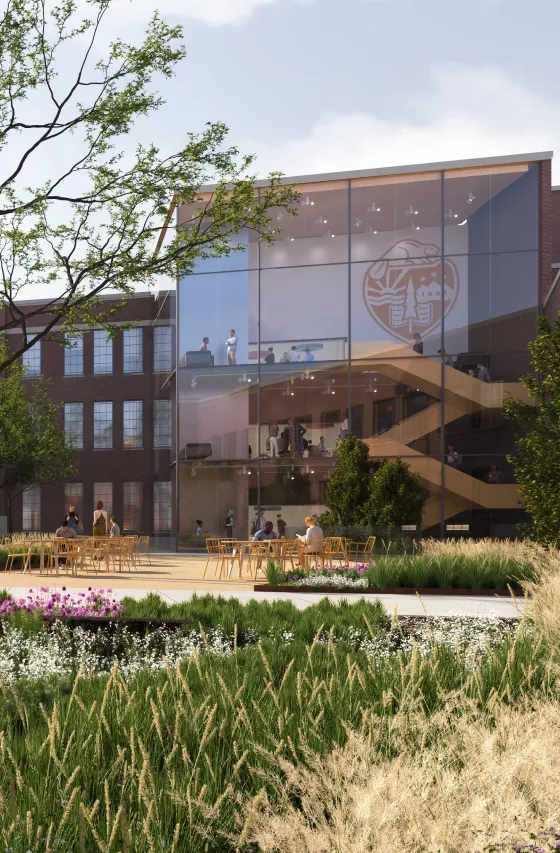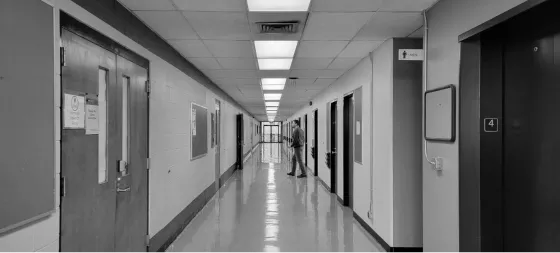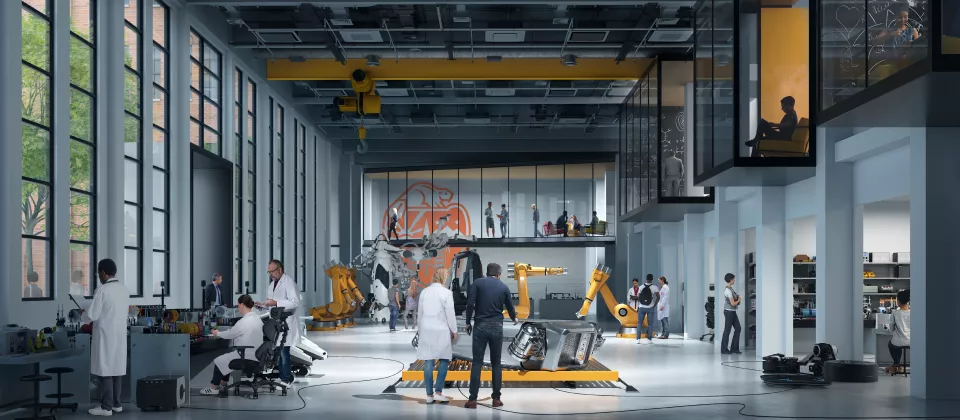Engineering NEXT
A master plan to position the College of Engineering for the next century of excellence
The learners, leaders, and thinkers in the College of Engineering at Oregon State University are committed to making the world better. Engineering Next will help us do it.
Engineering Next is an expansive master plan with a feasible timeline and a long-term vision.
This vision includes detailed plans to:
- Increase high-quality research space by 25% within the college’s existing footprint
- Decarbonize a small handful of research buildings
- Expand the Radiation Center and the O.H. Hinsdale Wave Research Lab — two signature facilities that currently turn away research projects due to limited capacity
Facilities are one of the best tools for recruiting and retaining top research faculty to find solutions to some of today’s biggest challenges: access to clean water and energy, semiconductor development, mitigation of climate impacts, and responsible AI.
Transforming our spaces to reflect Oregon State’s status as a highly productive R1 university will require investments from the university, the State of Oregon, and private philanthropy.

Refreshing the Engineering Triangle
and Beyond
New and improved spaces will enhance the college’s research capacity

Unlocking Untapped Potential
The College of Engineering’s rapid growth continues to be supported by major capital investments, including the forthcoming Jen-Hsun Huang and Lori Mills Huang Collaborative Innovation Complex. These investments, however, don’t help transition the College’s legacy buildings to align with contemporary engineering teaching and research practices.
Transitioning the COllege of engineering’s Legacy Buildings
Over the next five to seven years, the University and College envision addressing this transition through a series of minimally disruptive projects that renew COE’s legacy teaching and research facilities from the Engineering Triangle’s core to nationally exceptional experimental research facilities on the west side of campus.
small projects, big impact
Key to this is the modest scale and distributed nature of these investments. Each project unlocks untapped potential, getting walls out of the way of human connection, allowing greater flexibility to accommodate urgent areas of research, and providing a greater range of spaces that are more inclusive and accommodating of human diversity.
Equally important, the modest scale allows OSU greater flexibility in funding, whether from university budgets or philanthropic partners.
Opportunities
- Recruit and retain top faculty in key research areas
- Increase high-quality research space by 25% within the college’s existing footprint
- Increase wayfinding and college identity in historic buildings
- Increase the sense of connectedness with the College of Engineering community
- Empower hands-on experiential learning for engineering students
Priority Projects
Through the discovery, ideation, and planning process,
the university and the college have prioritized a series of Engineering Next projects.
Some of these projects can happen at any time, some can be on-going,
some need to be enabled, and some are framing for the long-term.

Finding Your Way
COE’s buildings, particularly those in the heart of the Engineering Triangle, are not consistently connected with each other, leading users to navigate a labyrinthine set of corridors, stairs, and elevators that often mean going through a door only to find yourself in another building and on another floor. This confusion is further compounded by the general lack of coherent signage and wayfinding systems throughout the Triangle.
Under the wayfinding plan, all main entry points require a unified wayfinding system to provide a sense of arrival that is welcoming and inviting to visitors and the campus community. Signage will offer a distinct journey that clearly marks each decision-making point, enabling visitors to easily and quickly locate their destination and the path to take. And along the journey, signage will also tell stories that put the accomplishments of the college’s students, faculty, and alumni on display.
O.H. Hinsdale Wave Research Laboratory
Add open-air sheltered lay-down research space to co-locate and expand research capacity, deepen existing wave tank for advance testing of submersible robots, and improve public appearance with new entrance canopy.
Radiation Center
Expand high-bay research space to support the growth and advancement of nuclear science research at the university.
Dearborn Maker’s Hall
Revive historic high-bay space into a dynamic “Makers Hall” housing a series of mini-fabs for student projects and establishing the space as the hub for the college’s Innovation Labs (iLabs).
Engineering Plaza
Re-imagine the existing parking lot as a vibrant and inviting social space by extending Dearborn Makers Hall out into a “Makers Yard” that will foster collaboration and greatly enhance the visual experience of the Engineering Triangle.
Rogers Hall
Renovations in Rogers will triple research capacity, provide open work areas for graduate students, and decarbonize the building.
Classrooms
Office space will be converted to 4,500 sqft of new, contemporary classroom space in Batcheller and Covell Halls.

Ample natural light, views out to Monroe Avenue, and labs conveniently adjacent to write-up space

Limited visibility into labs on the left and offices on the right
Engineering NEXT
Timeline
The schedule for Engineering Next projects is aggressive and driven
to bring as much modernized research space online as soon as possible.

Contact
To learn more about Engineering Next, contact:
Aimee Jirak
Senior Director of Development
